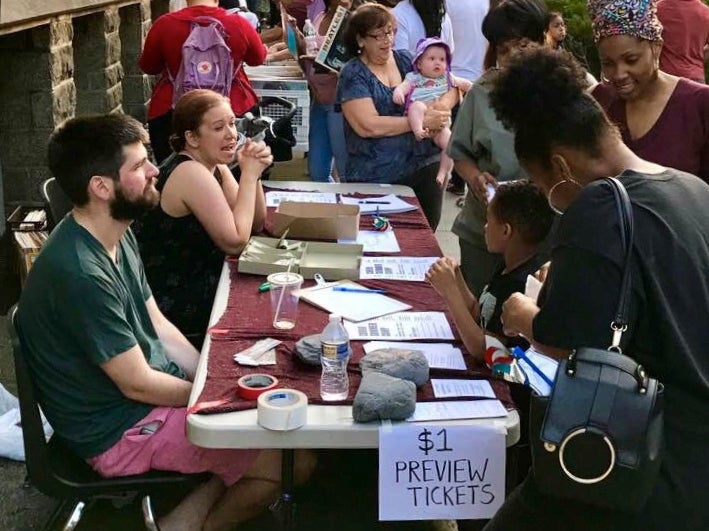Philadelphia theater companies experiment with pay-what-you-want pricing
Theater companies are reaching out to lower-income patrons with alternative ticketing models.
Listen 2:04
Curio Theatre Company sells $1 tickets at the Baltimore Avenue Dollar Stroll in June 2018. (Courtesy of Curio Theatre Co.)
Every summer, businesses along Baltimore Avenue in West Philadelphia set up tables on the sidewalk and participate in the popular Dollar Stroll, selling bites of food or trinkets to passersby for $1.
One of those businesses is the Curio Theatre Company, based in the Calvary United Church on 48th Street. Because the Dollar Stroll occurs in the summer, when Curio is dark, the company decided to sell vouchers to any upcoming preview performance for a buck.
It was a hit.
“If we give you a ticket in July, are you going to remember to come back in February or April?” said company member Elizabeth Carlson-Guerin.
The answer for the last several years? Absolutely.
“The amount we sell is about the amount who use them,” she said. “We sell out. People line up to make sure they get them.”
Curio is a relatively small theater company catering mostly to its West Philly neighborhood. It’s concerned about being able to provide opportunities to see theater to all of its neighbors. Providing inexpensive tickets is one way to do that.
For its current production of “The Winter’s Tale,” Curio is dropping ticket prices from $1 to $0. With support from the Wyncote Foundation, the company has launched CuriosiTix, a pay-it-forward ticketing model that encourages wealthier patrons to subsidize the cost for those who aren’t as well off.
That means you decide what to pay. You can pay $100, $0, or anywhere in between.
“Our neighborhood is very economically diverse. People who can afford to pay more than what we charge, and people who can’t afford — and don’t come to our doors — the $20 that it costs,” said Carlson-Guerin. “We are asking those with means to put those means toward a neighbor. It will all work out in the wash.”
“CuriosiTix” is an experiment, one underwritten by a $10,000 grant from the Wyncote Foundation
“We knew it would be a huge financial risk. We are inviting people to not pay to see our shows. We have bills, and we pay actors and designers,” said Guerin. “It’s a new thing. We’re figuring it out.”
There is evidence to suggest it could work.
In 2016 another city company, Azuka Theatre in downtown Philadelphia, started a pay-what-you-decide model allowing audiences to pay for their tickets after seeing the performance, at whatever amount they believe the production deserves.
Azuka Theatre tends to produce new plays, most of them unfamiliar to audiences. Artistic director Kevin Glaccum wanted to encourage people to come to a play they have never heard of, without the risk of dropping a lot of cash on something they don’t like.
“More interestingly, it starts a conversation between the makers of art and consumers of art,” said Glaccum. “They are telling us what they think via their wallets.”
At Azuka, the ticketing experiment has been useful as an engagement tactic. When the curtain falls and the lights go up, audiences look into their hearts, souls, and pocketbooks to consider what just happened onstage. What impact did this have on me, and how do I put a price on it?
It’s been working.
“Our numbers have gone up in attendance and income. Considerably. Like, 30%,” said Glaccum. “People are giving us more money, and more of them are coming.”
Azuka Theatre’s pay-what-you-decide experiment was underwritten by the Barra Foundation for two seasons. It proved so successful that Glaccum continued it for a third season, 2018-2019, without that financial safety net. He said he’ll keep doing it as long as it works.
WHYY is your source for fact-based, in-depth journalism and information. As a nonprofit organization, we rely on financial support from readers like you. Please give today.





